新目标八年级下Unit-9学案及练习
人教版新目标英语八年级下册:Unit 9《Have you ever been to museum》 讲解+练习题目+答案
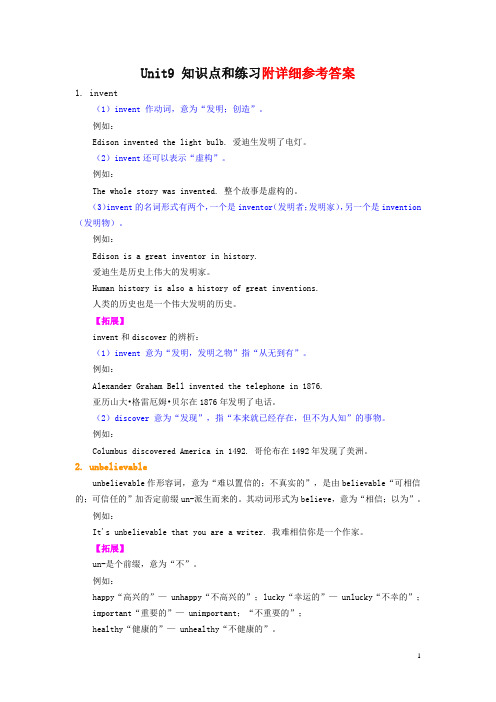
Unit9 知识点和练习附详细参考答案1. invent(1)invent 作动词,意为“发明;创造”。
例如:Edison invented the light bulb. 爱迪生发明了电灯。
(2)invent还可以表示“虚构”。
例如:The whole story was invented. 整个故事是虚构的。
(3)invent的名词形式有两个,一个是inventor(发明者;发明家),另一个是invention (发明物)。
例如:Edison is a great inventor in history.爱迪生是历史上伟大的发明家。
Human history is also a history of great inventions.人类的历史也是一个伟大发明的历史。
【拓展】invent和discover的辨析:(1)invent 意为“发明,发明之物”指“从无到有”。
例如:Alexander Graham Bell invented the telephone in 1876.亚历山大•格雷厄姆•贝尔在1876年发明了电话。
(2)discover 意为“发现”,指“本来就已经存在,但不为人知”的事物。
例如:Columbus discovered America in 1492. 哥伦布在1492年发现了美洲。
2. unbelievableunbelievable作形容词,意为“难以置信的;不真实的”,是由believable“可相信的;可信任的”加否定前缀un-派生而来的。
其动词形式为believe,意为“相信;以为”。
例如:It's unbelievable that you are a writer. 我难相信你是一个作家。
【拓展】un-是个前缀,意为“不”。
例如:happy“高兴的”— unhappy“不高兴的”;lucky“幸运的”— unlucky“不幸的”;important“重要的”— unimportant;“不重要的”;healthy“健康的”— unhealthy“不健康的”。
新目标八年级英语下册第九单元学案
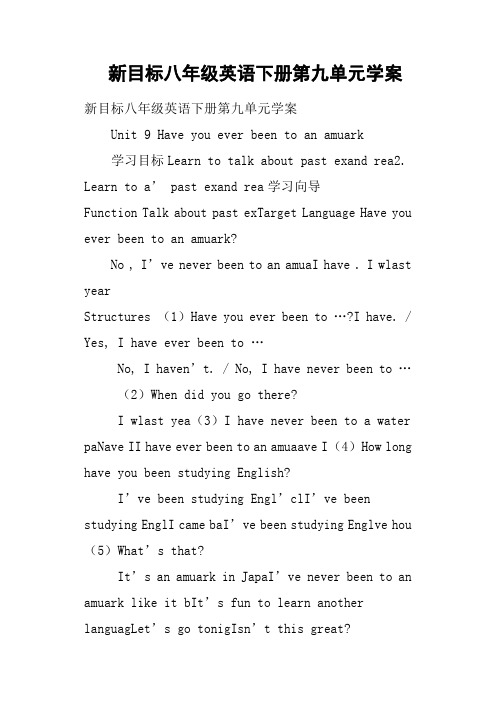
新目标八年级英语下册第九单元学案新目标八年级英语下册第九单元学案Unit 9 Have you ever been to an amuark 学习目标Learn to talk about past exand rea2. Learn to a’ past exand rea学习向导Function Talk about past exTarget Language Have you ever been to an amuark?No , I’ve never been to an amuaI have . I wlast yearStructures (1)Have you ever been to …?I have. / Yes, I have ever been to …No, I haven’t. / No, I have never been to …(2)When did you go there?I wlast yea(3)I have never been to a water paNave II have ever been to an amuaave I(4)How long have you been studying English?I’ve been studying Engl’clI’ve been studying EnglI came baI’ve been studying Englve hou (5)What’s that?It’s an amuark in JapaI’ve never been to an amuark like it bIt’s fun to learn another languagLet’s go tonigIsn’t this great?Key VocabulaPhrases space museum, amuark, water park, South America, Peru, Holland, European culture, tour guide, flight attendant, musical instruan, bgake ldiscover, graduate, change学习策略思维技巧 Listeningaating多元智能 1.Disneyland 了解相关文化背景。
新目标英语八年级下Unit 9 Have you ever been to a museum单元学案
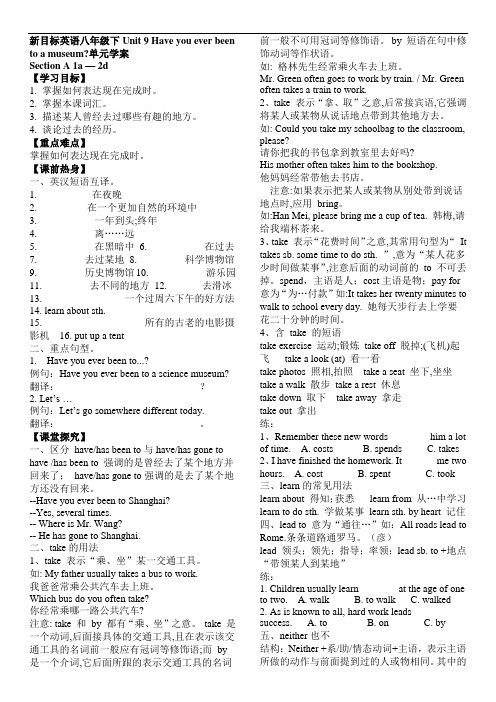
新目标英语八年级下Unit 9 Have you ever been to a museum?单元学案Section A 1a — 2d【学习目标】1. 掌握如何表达现在完成时。
2. 掌握本课词汇。
3. 描述某人曾经去过哪些有趣的地方。
4. 谈论过去的经历。
【重点难点】掌握如何表达现在完成时。
【课前热身】一、英汉短语互译。
1.__________ 在夜晚2._________ 在一个更加自然的环境中3. __________ 一年到头;终年4. __________ 离……远5. __________ 在黑暗中6. __________ 在过去7. ________ 去过某地8. ________ 科学博物馆9. ________ 历史博物馆10. __________ 游乐园11. ________ 去不同的地方12.______ 去滑冰13. _______________ 一个过周六下午的好方法14. learn about sth. __________15. ___________________ 所有的古老的电影摄影机16. put up a tent __________二、重点句型。
1. Have you ever been to...?例句:Have you ever been to a science museum? 翻译:____________________________?2. Let’s …例句:Let’s go somewhere different today.翻译:____________________________。
【课堂探究】一、区分have/has been to与have/has gone to have /has been to 强调的是曾经去了某个地方并回来了;have/has gone to强调的是去了某个地方还没有回来。
--Have you ever been to Shanghai?--Yes, several times.-- Where is Mr. Wang?-- He has gone to Shanghai.二、take的用法1、take 表示“乘、坐”某一交通工具。
新目标八年级英语下册第9单元学案

Unit9 Have you ever been to the amusement park?单元目标: A:contents: Unit9 5 periodsB:Aims and demands:Talk about9 现在完成时.C: Teaching importance: have/has +pp.单元语法现在完成时(一)概念以及构成概念:(1)表示过去发生或已经完成的动作对现在造成的影响或结果(2)表示从过去已经开始持续到现在的动作或状态。
由have/has(助动词) + done (过去分词)构成(二)现在完成时态的基本句式1.肯定句:主语+have/has+过去分词+其他2.否定句:主语+haven’t/hasn’t+过去分词+其他3.一般疑问句:Have/Has+主语+过去分词+其他?肯定回答:Yes,主语+have/has 否定回答:No,主语+have/has not.4.特殊疑问句:疑问词+have/has+主语+过去分词+其他?(三)与现在完成时连用的时间状语:1.already(已经),never(从未),ever(曾经),just(刚刚),before(以前),yet(已经)等副词。
2.for+时间段,since+过去的时间点,how long (动词必须是延续性动词)3.up to now, in the past/last few years, recently, so far现在完成时与一般过去时区别:1.一般过去时强调过去发生的动作或叙述过去发生的事情;现在完成时为过去发生的事情对现在的影响,强调影响。
I saw this movie yesterday.(强调看的动作发生了)I have seen this film.(强调对现在的影响,电影的内容已经知道了)2.一般过去时与具体地表示过去的时间状语连用:yesterday,last year,…ago,in 1990/September,just now3.现在完成时可表示持续到现在的动作或者状态,动词是延续性的;一般过去时常用非延续性的。
新目标英语八年级下册Unit 9 Have you ever been to an amusement park讲解与练习

第 1 页 (共4 页) 第 2 页 (共4 页)学校 姓名 班级 考场 考号---------------------------------○密------------------ -------------------○封----------------------------- -- --○线----------------------------※※※※※※※※※※※※※※※答※※※※※※※※※※※※※※※※※※题※※※※※※※※※※※※※※※※线※※※※※※※※※※※※※新目标英语八年级下册Unit 9 Have you ever been to an amusement park?讲解与练习重要短语1. have been to 到过某处2. an amusement park 游乐园3. a water park 水上公园4. a roller coaster 过山车5. see sb. doing sth. 看见某人正在做某事 see sb. do sth. 看见某人做了某事6. walk around 四处走动7. take a ride 兜风 8. on board 在船上 9. take different routes 走不同的路线 10. end up 结束 11. argue with sb. 与某人争吵 12. an English-speaking country 说英语的国家 13. an exchange student 交换生 14. a flight attendant 一名机组乘务员 15. a tour guide 导游 16. such as 例如 17. listening skills 听力技能 18. in Southeast Asia 在东南亚 19. take a holiday 度假 20. three quarters 四分之三 21. have problems (in) doing sth. 做某事很费劲 22. during the daytime = in the day 在白天 23. all year round 全年,一年到头 24. wake up 醒来,唤醒,叫醒 句子讲解1.Have you ever been to an amusement park?你曾到过游乐场吗?(1)amusement park 游乐场,游乐园 (2)本句用现在完成时表示过去发生的事情对现在造成的影响或结果。
新目标人教版八年级英语(下)Unit 9英语学案设计(含答案)

人教版八年级英语(下)Unit 9英语学案班级____________ 姓名_____________ 学号________[课前自学][合作探究]] 翻译题. SectionA:1你曾经去过太空博物馆吗?____________________________________________________ 2今天我们去不同的地方吧。
______________________________________________________3 我们在外面搭起帐篷,做起饭来。
_________________________________________________4 你曾经参观过历史博物馆吗?___________________________________________________5 我已经去过几次那里了。
_______________________________________________________SectionB:6 你尝过中国食品吗?___________________________________________________________7对成千上万的中国游客来说,这个小岛是个度假的好地方。
_______________________________________________________________________________ 8 新加坡是一个讲英语的国家。
_______________________________________________________________________________ 9 如果你白天去看狐狸,他们很可能睡着了。
_______________________________________________________________________________ 10 在新加坡,气温全年几乎一样。
新目标八年级英语下册unit9复习学案
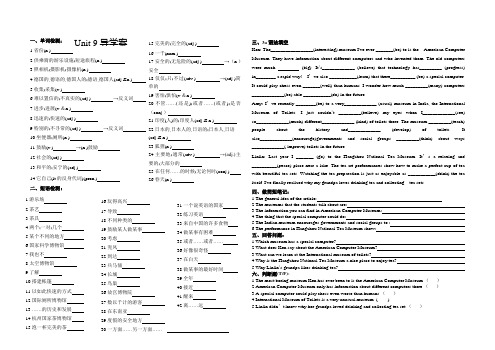
1.省份2.3.照相机4.德国的5.收集;6.7.进步;8.迅速的9.特别的10.11.鼓励12.13.14.三、3a语法填空Ken: The_________________(interesting) museum I've ever _______(be) to is the American Computer Museum. They have information about different computers and who invented them. The old computers were much (big). It’s_____________ (believe) that technology has_________ (progress) in________ a rapid way! I’ve also ___________(learn) that there__________ (be) a special computer. It could play chess even _______(well) than humans. I wonder how much _________(many) computers _____________(be) able ___________(do) in the future.Amy: I’ve recently ________(be) to a very_____________ (usual) museum in India, the International Museum of Toilets. I just couldn’t _________(believe) my eyes when I_____________(see) so_____________(much) different_____________ (kind) of toilets there. The museum _________(teach) people about the history and_____________ (develop) of toilets. It also_____________(encourage)governments and social groups _________(think) about ways _____________( improve) toilets in the future.Linlin: Last year I _______ (go) to the Hangzhou National Tea Museum. It’s a relaxing and __________(peace) place near a lake. The tea art performances show how to make a perfect cup of tea with beautiful tea sets. Watching the tea preparation is just as enjoyable as ___________(drink) the tea itself. I've finally realized why my grandpa loves drinking tea and collecting tea sets.四、做简短笔记:1.The general idea of the article:2.The museums that the students talk about are:3.The information you can find in American Computer Museum:4.The thing that the special computer could do:5.The Indian museum encourages governments and social groups to :6.The performance in Hangzhou National Tea Museum show:1.Which museum has a special computer?2.What does Ken say about the American Computer Museum?3.What can we learn at the International museum of toilets?4.Why is the Hangzhou National Tea Museum a nice place to enjoy tea?’s grandpa likes drinking tea?(T/F):()()())’t know why her grandpa loved drinking and collecting tea set.()七、3a大意总结(根据问题概括文章大意,60-80词):1. Where have Ken, Amy and Linlin been to?2. What can we learn at the American Computer Museum?3. What can we learn at the International museum of toilets?4. How is the Hangzhou national Tea museum?5. How do they feel about their trips?八、2b语法填空:Fill in the blanks.Have you ever (be) to Singapore? For thousands Chinese tourists,this is ______ island that is wonderful and small in Southeast. It is a safe place ___________(take) a holiday. On the one hand, more than three (quarter) of the population ______(be) Chinese, so you can _________(simple) speak Putonghua. On (other) hand, Singapore is an English-speaking country, so it's a good place __________(practice) English!Have you ever tried Chinese food outside of China?Maybe you fear that you won’t be able to find _____________(something) (well) _________(eat) when you travel.In Singapore,however,you’ll find a lot of food from China;you won’t have any problem __________(get) rice,noodles or dumplings. Singapore is also ________excellent place ____________(try) new food. ___________you like Indian food, Western food or Japanese food, you'll find it all in Singapore!Most large cities have zoos, but have you ever been to a zoo at night? Singapore has a Night Safari. . It might seem strange to go to a zoo when it's dark. However, if you go to see lions, tigers or foxes during the daytime , they’ll probably be _____ (sleep)! A lot of animals only wake up at night,so this is the best time _____ (watch) them.At the Night Safari,you can watch these animals in a ___________(nature) environment than in a normal zoo.One great thing about Singapore is that the temperature is almost the same all year round. This is because the island is so close ________the equator. So you can choose _________(go)whenever you like- spring, summer,autumn or winter.And,of course, it's not too far from China!九、做简短笔记:1. The general idea of this passage:2. Languages spoken in Singapore:3. Chinese food we can find in Singapore:4. The special thing we could do at Night Safari:5. The reason why the temperature in Singapore is almost the same:十、回答问题:1. Where is Singapore?2. What languages do people speak in Singapore?3. What kinds of food can we eat in Singapore?4. What is the best time to watch animals? Why?5. Why is the temperature almost the same all year round?十一、判断题(T/F):1.Most people in Singapore only speak English.()2.For Chinese people, Singapore is a good place to take a holiday and practice English. ()3.It is easy to get many different kinds of good food in Singapore.()4.It is better to see lions and tigers during the daytime because they will probably be awake.()5.It is best to visit Singapore in the autumn.()十二、2b大意总结(根据问题概括文章大意,60-80词):1. What do tourists think of Singapore?2. What language do people in Singapore speak?3. What kinds of food do they have?4. What is the most famous zoo in Singapore?5. What's the weather like in Singapore and what is the best time to visit it?十三、汉译英:1.我还了解了一些发明,它们成就了彩色电影。
人教新目标版八年级英语下册导学案第九单元(含答案)
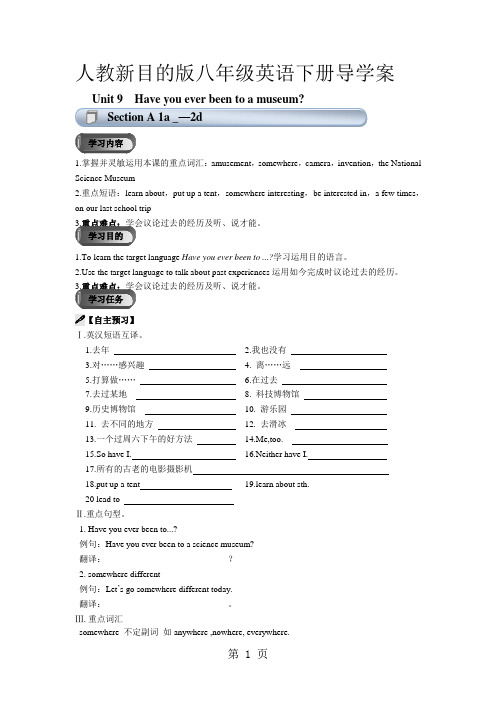
人教新目的版八年级英语下册导学案1.掌握并灵敏运用本课的重点词汇:amusement,somewhere,camera,invention,the National Science Museum2.重点短语:learn about,put up a tent,somewhere interesting,be interested in,a few times,on our last school trip学会议论过去的经历及听、说才能。
1.To learn the target language Have you ever been to ...?学习运用目的语言。
e the target language to talk about past experiences运用如今完成时议论过去的经历。
学会议论过去的经历及听、说才能。
✂【自主预习】Ⅰ.英汉短语互译。
1.去年2.我也没有3.对……感兴趣4. 离……远5.打算做……6.在过去7.去过某地8. 科技博物馆9.历史博物馆10. 游乐园11. 去不同的地方12. 去滑冰13.一个过周六下午的好方法14.Me,too.16.Neither have I.17.所有的古老的电影摄影机18.put up a tent 19.learn about sth.__________________20 lead toⅡ.重点句型。
1. Have you ever been to...?例句:Have you ever been to a science museum?翻译:____________________________?2. somewhere different例句:Let’s go somewhere different today.翻译:____________________________。
Ⅲ.重点词汇somewhere不定副词如anywhere ,nowhere, everywhere.复合不定副词被定语所修饰时,形容词或不定式等其他定语那么必须后置。
人教新目标版八年级英语下册导学案第九单元(含答案)

人教新目标版八年级英语下册导学案1.掌握并灵活运用本课的重点词汇:amusement,somewhere,camera,invention,the National Science Museum2.重点短语:learn about,put up a tent,somewhere interesting,be interested in,a few times,on our last school trip学会谈论过去的经历及听、说能力。
1.To learn the target language Have you ever been to ...?学习运用目标语言。
e the target language to talk about past experiences运用现在完成时谈论过去的经历。
学会谈论过去的经历及听、说能力。
【自主预习】Ⅰ.英汉短语互译。
1.去年2.我也没有3.对……感兴趣4. 离……远5.打算做……6.在过去7.去过某地8. 科技博物馆9.历史博物馆10. 游乐园11. 去不同的地方12. 去滑冰13.一个过周六下午的好方法14.Me,too.16.Neither have I.17.所有的古老的电影摄影机18.put up a tent 19.learn about sth.__________________20 lead toⅡ.重点句型。
1. Have you ever been to...?例句:Have you ever been to a science museum?翻译:____________________________?2. somewhere different例句:Let’s go somewhere different today.翻译:____________________________。
Ⅲ.重点词汇somewhere 不定副词如anywhere ,nowhere,everywhere.复合不定副词被定语所修饰时,形容词或不定式等其他定语则必须后置。
新目标八年级英语下册第九单元学案

新目标八年级英语下册第九单元学案Unit9Haveueverbeentanauseentpar学习目标Learnttalabutpastexperieneandreasns2Learntasthethers’pastexperieneandreasns学习向导FuntinTalabutpastexperieneTargetLanguageHaveueverbeentanauseentpar?N,I’veneverbeentanauseentpares,IhaveIenttherelastearStrutures(1)Haveueverbeent…?es,Ihave/es,Ihaveeverbeent…N,Ihaven’t/N,Ihaveneverbeent…(2)hendidugthere?Ienttherelastear(3)IhaveneverbeentaaterparNeitherhaveIIhaveeverbeentanauseentparShaveI(4)HlnghaveubeenstudingEnglish?I’vebeenstudingEnglishsinenine’lI’vebeenstudingEnglishsineIaebaheI’vebeenstudingEnglishfrfivehurs()hat’sthat?It’sanauseentparinapanI’veneverbeentanauseentparlieitbefreIt’sfuntlearnantherlanguageLet’sgtnightIsn’tthisgreat?eVabularePhrasesspaeuseu,auseentpar,aterpar,SuthAeria,Peru,Hlland,E urpeanulture,turguide,flightattendant,usialinstruen t,rethan,befr,gett,taelessns,neither,disver,graduat e,hange学习策略思维技巧Listeningtspeifiinfratinperating多元智能.Disneland了解相关文化背景。
新目标八年级英语下册Unit9 Section A导学案

新目标八年级英语下册Unit9 Section A导学案一、课前预习
在开始本节课的学习之前,请同学们复习一下以下词汇:
1.词汇1
2.词汇2
3.词汇3
二、课堂导入
在导入环节,老师可以通过以下问题引导学生思考和回答:
1.问题1
2.问题2
3.问题3
三、新课讲解
今天我们要学习的是Unit9的第一节课,主要内容如下:
1. 主题1
在这个主题中,我们将学习关于…
(1)要点1
要点1的内容是…
(2)要点2
要点2的内容是…
2. 主题2
我们还将学习关于主题2的内容,包括…
(1)要点1
要点1的内容是…
(2)要点2
要点2的内容是…
四、课堂练习
为了帮助同学们巩固所学的知识,我们来做一些课堂练习。
1.题目1
2.题目2
3.题目3
五、课堂总结
在本节课结束前,我们来总结一下今天学到的内容。
•总结1
•总结2
•总结3
六、作业布置
请同学们回家后完成以下作业:
1.作业1
2.作业2
3.作业3
七、教学反思
在本节课结束后,老师可以对本节课的教学进行反思和总结,并记录下一节课的备课思路和注意事项。
注意:本文档为Markdown文本格式,不含图片和网址。
新目标八年级英语下册第九单元学案

新目标八年级英语下册第九单元学案Unit 9 Have you ever been to an amusement park 1. Learn to talk about past experience and reasons. 2. Learn to ask the others鈥?past experience and reasons. 瀛︿範鍚戝Function Talk about past experience Target Language Have you ever been to an amusement park? No , I鈥檝e never been to an amusement park . Yes , I have . I went there last year Structures 锛?锛塇ave you ever been to 鈥? Yes, I have. / Yes, I have ever been to 鈥?No, I haven鈥檛. / No, I have never been to 鈥?锛?锛塛hen did you go there? I went there last year. 锛?锛塈have never been to a water park. Neither have I. I have ever been to an amusement park. So have I. 锛?锛塇ow long have you been studying English? I鈥檝e been studying English since nine o鈥檆lock. I鈥檝e been studying English since I came back home. I鈥檝e been studying English for five hours. 锛?锛塛hat鈥檚that? It鈥檚an amusement park in Japan. I鈥檝e never been to an amusement park like it before. It鈥檚fun to learn another language. Let鈥檚go tonight. Isn鈥檛this great? Key Vocabulary Key Phrases space museum, amusement park, water park, South America, Peru, Holland, European culture, tour guide, flight attendant, musical instrument, more than, be from, get to, take lessons, neither, discover, graduate, change 瀛?涔?绛?鐣?鎬?缁?鎶€宸?Listening to specific information Cooperating 澶氬厓鏅鸿兘1锛嶥isneyland 浜嗚В鐩稿叧鏂囧寲鑳屾櫙銆?2锛庝笘鐣屽湴鐞嗙煡璇嗐€?Recycling 澶嶄範鐩稿叧鐨勮瘝姹囷細zoo hotel restaurant bus boat杩囩▼Teaching steps The first period: ( From Section A 1a to Grammar focus ) Aim: To practice listening skills; to study new words and to know how to give advice. Practice the sentences锛欻ave you ever been to 鈥? Yes, I have. / Yes, I have ever been to 鈥?No, I haven鈥檛. / No, I have never been to 鈥?Steps Teacher鈥檚activities Students鈥?activities Step1 Lead-in Look at the picture, and ask the students, 鈥淲hat can you see from the picture?鈥?Look at the picture and brainstorm the words they can think of, such as space museum, amusement park, water park, zoo, aquarim Step 2 Word study Show some words about places in 1a. Ask students to write some more words about places on the notebook. Students write the places they have known. Step 3 Pairwork Let students tell each other what they think of these places. And finish 1a. Students tell each other what they think of these places. Finish 1a. Step 4 Listening 1b Point out the picture and the places in the picture. Ask the students to guess what the two girls are talking about. Ask the students to read the conversations in the picture to help them to understand the following listening. Ask the students to listen and number the sentences from 1 to 4. Check the answers. Ask the students to practice the dialogue. Just look at the picture and say the words of the places. Guess what the two girls are talking about. Read the conversations in the picture and understand. Listen and check the boxes Check the answers. Practice the dialogue in pairs. Step5 Listening 2a & 2b Point out the chart. Says, 鈥淵ou will hear three conversations. After each conversation, circle the places you hear Check the answers. Point out the sentences. Ask the students to read them to the class. Ask the students to listen again and finish 2a. Correct the answers. Read the chart before listening. Listening to the saying of the teacher. circle the places Read the sentences and listening again. Listen again and finish the chart. Correct the answers. Step 6 2c Read the instructions Point to the map and tell the students they can talk about any of the places on the map Ask them talk about a place they have been to. Think of a place they have been to. Making a dialogue in pairs using the target language. Such as: Have you ever been to 鈥? Yes, I have. / No, I haven鈥檛. When did you go there? I went there 鈥?How did you go there? I went there by 鈥?Where are you going next week? I鈥檓going to 鈥?How are you going there? Who are you going with ? Step 7 Grammar focus Review the grammar box.Ask students to say their statements and responses. Learn the gammar. Homework: 1. Finish the 9th unit in the kkl. 2. Getting ready for a best gift you have received. The second period: ( Section A) Task 1 : Have you ever been to Disneyland? Aim: Talk about somewhere they have been to . Steps Teacher鈥檚activities Students鈥?activities Step 1 Lead-in Show them some pictures about Disneyland What do you know about Disneyland ? Students guess what is it. Say something about Disneyland Step2 reading Read the instructions , show them the chart, have them finish it. Interesting:______________________________ Boring:________________________________________ Play the tapescript for them Read the article Finish the chart Check the answers Listn and read practice reading Step3 Pairwork Read the simple to the class Have them read the article Again and write a conversation Make a conversation Practice the Conversation with partner Step 4 Pairwork Ask Students to make a survey. Choose some pairs to act out Practice by using Have you ever been to been to 鈥?Yes ,I have. No, I haven鈥檛Act out in the class Home work: Write the conversations down The third period: (Section B, Listening) Task 1: Why do you study English ? Aim: Practice: Why do you study English ? I want to 鈥?. I have to. It鈥檚+ adj.+ to do Steps Teacher鈥檚activities Students鈥?activities Step 1 Lead-in Ask the Ss the reasons why they want to learn English. And write down the reasons they say out. Order the number they think the most import reason and continue the same way Step 2 Pairwork Ask some students: Why do you study English ? Say out the reasons Ask and answer in pairs Some pairs act out Task 2: How long have been studying English ? Step 3 Section B 2a,2b Ask the students to read the statements Play the tape Check the answers Ask the Ss finish the following questionnaire: Name: Studying English for: When and why:English-speaking countries visits: When: Reason for learning English: Read the statements and get ready for reading Listen and circle the questions . Listen again and fill in the questionnaire Check the answers Step 4 Pairwork Talk about thequestionnaire in 2c with a student. Make a modal. T: What鈥檚the you name? S: His name is Thomas Buzic. T: How long has he been studying English? S: He has been studying English for 3 years. T: Has he ever been to an English-speaking country? S: Yes, he has been to the USA. T: When did he go there? S: He went there when he was 13. T: Why does he want to improve his English? S: Because he wants to travel the world.Ask the students to practice the dialogue. Practice making ing the following informations 1銆丠ow do you spell your name? 2銆丠ow long have you been studying English? 3銆?When did you start studying English? 4銆乄hy did you start studying English? 5銆丠ave you ever been to an English-speaking country? (When was that?) 6銆?Why do you want to improve your English? 7銆?What do you like best about studying English? 8銆?What kind of job do you want? Act out Homework: Write a place The fourth period: ( Section B, reading) Steps Teacher鈥檚activities Students鈥?activities Step 1 Lead- in Ask students some questions: 1銆乄hen did you start studying English? 2銆丠ow long have you been studying English? 3銆丠ow do you like our school ? Answer the questions. Step 2 Reading Point to the pictures in the text. Say this is Meishan, and that is David Feng. They are students from hilltop Language School. Before reading , ask them read the quewtions: 1銆乄hat does Mei Shan do? 2. How long has she had the job? 3. Why did she want the job?4. How long did she study English?5. What kind of job does Joseph want?6. Has he ever been to an English-speaking country?7. How long has he been studying at the school?8. What other job is he thinking of doing? Read the article at 3a quickly and find out the reasons why they learn English and what they think of the school. Talk about the reasons why they learn English and the ways that help them improve their English. Check the answers Step 3 Writing Section B 3b Ask the students to look atthe notes and write an article about them. Look at the notes and write an article about them. Homework: Write an article. The fifth period: More exercises.(Self Check)The sixth period: (Reading) Have you ever been to Singa pore? Section 1 Before you read Section 2 While you read First read: Ask What is the passage mainly about? Second read: Tell the students to ask themselves questions as they read. For instance: Section 3 After you read To study 3a Read the chart. Ask the students to complete the map with wods from the reading To study 3b Discuss in Groupwork. 鈥?To study 3c Homework: Write a summary of reading. Questionnaire Name: Studying English for: When and why: English-speaking countries visited: When: Reason for learning English: What: 锛坙ike锛?What: 锛坖ob锛?Places Where have you been When you went there How you got there Where will you go Water park Aquarium Space museum Zoo The Great Wall The museum palace Tian An Men Square Hawaii鈥?Names Have you ever.鈥?. Yes No The other experience been to an aquarium? traveled to another city? helped someone you did not know? studied English? been to an aquarium? traveled to another city? helped someone you did not know? studied English? been to an aquarium? traveled to another city? helped someone you did not know? studied English? been to an aquarium? traveled to another city? helped someone you did not know? studied English? Have you ever been to Xi鈥檃n where I was born and grew up? It鈥檚one of the most famous ancient cities in China as well as in the world. It is in Northwest China and was originally called Chang 鈥檃n. There are many places of historical interest, for example, the Greater Wild Goose Pagoda. Xi鈥檃n is a modern industrial city. There are many beautiful parks, shops, roads and museums of different kinds. You may enjoy the cultural features of the city and buy whatever you need at the same time.。
新目标八年级英语下unit9导学案

Unit9 Have you ever been to a museum ?Section A 1a—2d一、自学案:I.Write out the phrases and expressions given below:1. 有趣的某物2. 不同的某个地方3. 如此多令人兴奋的事4. 做某事的好方法、途径5. 了解、知道6. 搭帐篷7. 曾经到过某处8. 已经去了某处9.引导某人到某处10 通往;引起II. Fill in the blanks .1. —Have you ___________ been to Beijing? —Yes, I _____________.2. —Have you ever _________to England? —No, I _____________.3. —_________ you ever been to Chengdu? — N o, I’ve ______been there.4. —Have you______ been to the Great Wall? —Yes, I __________.5. —_______ your father ever been to HK? —No, he ________.二、助学案:★1. have been to ,have gone to,have been inhave been to :“到过,去过”,表示曾经到过某处have gone to :“去了”,表示已经去了某地,现在人在那儿没回来。
e.g: 1.Have you ever been to Zigong Dinosaur Museum ?Yes. I have been to Zigong Dinosaur Museum many times.Where’s Tom?He has gone to the teachers’ office ..Mary has gone to the bookshop to buy a book..★2.不定副词: somewhere anywhere everywhere nowhere 等的用法1.不定adv.+ adj. (形容词要放在不定副词的后面)2. somewhere 与anywhere的用法区别:3. 不定adv.前不能用介词。
新目标八年级英语下Unit9全单元教案(5份)

1. Frank had a great time at the water park. T/F
2. Frank’s friend has never been to the water park. T/F
3. Frank and his friend are going skating.T/F
__________________________________
Step 8 Homework
1. Practice the dialogue and remember the language points.
2. Preview the next lesson.
Step 9 Blackboard Design
时序
Teaching Procedures
Step 1 Greetings and Revision
Greet the class and check the homework.
Step 2 Lead-in
1.Guess the places of the pictures; they are the British Museum, space museum, history museum, water park, zoo, amusement park while lead in sentence patterns:“ Have you ever been to …?”
S4:Amusement park ______, water park ______, zoo ______ aquarium ______ space museum ______.
S5: Space museum ______, aquarium ______, zoo ______, water park ______, amusement park ______
人教新目标八年级英语下册Unit9复习练习含答案

人教新目标八年级英语下册Unit9复习练习含答案【课前热身】课前复习Unit9Unit 9 Have you ever been to a museum?1.娱乐;游戏________2.游乐场_______3.在某处;到某处_______4.照相机;摄影机;摄像机______5.发明;发明物_______6.发明;创造______7.难以置信的;不真实的___8.进步;进展_______9.迅速的;快速的______10.特别的;不寻常的______11.坐便器;厕所;_______12.鼓励_____13.社会的_________14.和平的;安宁的_________15.茶艺__________16.表演;演出________17.完美的;完全的_________18.茶具________19.它自己________20.收集;采集_______【课堂内容】Unit 9 Have you ever been to a museum? 短语归纳1.在夜晚at night1、在白天during the daytime2、乘地铁take the subwayA. sawB. have seenC. seeD. will see3. "This is a useful dictionary, I think. ""So it is,and it's ________ unusual one.”A. theB. anC. aD. 不填4. My host tried to cook ________ for me when I studied in New Zealand.A. different somethingB. different anythingC. something differentD. anything different5. Miss Lin _______ lot of work for the poor area since 2019.A. doesB. didC. has doneD. will do6. Anna is going on a tour of Van, and she wants to _________ Chinese history.A. dream ofB. look throughC. learn aboutD. pass on7. Have you ever read English novels? ________.A. Yes, I didB. Yes, I haveC. No, I haveD. No, I don't8. When I walked past the park, I saw some old people ________ Chinese Taiji.A. doesB. didC. doingD. are doing9. I have never been to European countries. What about you? _________.A. I tooB. Me tooC. I eitherD. Me neither10. Have you __________ been to Xiamen? No, ________.A. ever; neverB. never; everC. ever; everD. never; never11. Hello! Is that Mr. Jiang? No, he _________ Guiyang. He will be back in more than two weeks.A. goesB. wentC. has gone to D has been to12. It's a fine day today. How about ________?A. go campingB. go to campC. going campingD. to go to camp13. How long have you .here? For two days. I ________ here the day before yesterday.A. been; cameB. come; cameC. came; cameD. come; was14. My parents often tell me _______ too much junk food because it's bad for my health.A. not eatingB. not to eatC. eatingD. to eat15. All the Chinese people must work hard China Dream.A. to realizeB. realizeC. realizingD. realized二、随堂练习完型填空(每小题1分,共10分)21omThe first Disneyland in Europe was opened in France in 1992. At first, it was known ____ (21)"Euro-Disney", but it was renamed “Disneyland Paris" in 1994. It is now one of the most successful Disney theme _____ (22) in the world with up to 70000 _____ (23), a day during the warm summer months.The park has five different sections (部分)called "lands". Each land has its own unusual and exciting features (特点). The five different lands are called Main Street USA, Adventure land,Frontier land, Fantasyland and Disneyland. After ______ (24) the lands, you can have a meal in one of the many restaurants in the park or you can meet _____ (25), and Donald Duck. _____ (26) not visit Disney Village? In Disney Village you can relax and______(27) the beautiful scenery,go shopping or visit a night club.The Newport Bay Club is one of these hotels and is, in fact, the _____ (29) hotel in Western Europe.We know that you will love Disneyland because it has _____ (30) for everyone. Book your trip of a lifetime now!21. A. for B. as C. with D. at22. A. places B. garden C. museums D. parks23. A. children B. visitors C. players D. men24. A. living B. staying C. working D. visiting25. A. Superman B. Walt Disney C. Tom and Jerry D. Mickey Mouse26. A. What B. How C. When D. Why27. A. enjoy B. watch C. hear D. receive28. A. houses B. hotels C. places D. homes29. A. small B. larger C. largest D. smaller30. A. something B. everything C. anything D. nothing课后作业一.阅读理解。
人教版 新目标 八年级下册九单元英语教案

英语七年级下册教学教案学科英语时间一个课时地点教室执教者晏江琼课题Unit9 Have youever been to anamusementpark?年级八年级教材分析教材在结构设计中加大了探究活动的力度,通过“活动”和“综合探究”这两种形式,切实让学生参与到教学活动中,增强了教材的探究性和实践性;教学内容的呈现形式多种多样。
教材中尝试不同的呈现方式,不断给学生以新鲜感,激发他们对英语的兴趣。
语言平实、生动,版式设计生动活泼。
教学目标Language goal: Learn how to use the present perfect tense.Teaching aims: The present perfect tense (结构:have(has)+过去分词)教学重、难点现在完成时的运用;非持续性动词和持续性动词在现在完成时中的变换。
教学准备粉笔、教案、学案教学过程教学环节教师教学(我做什么)学生学习(学生做什么)备注大环节小环节导入WarmingupGreet students.T: Good morning , Boys andgirls, We learned unit9 2cyesterday , today , let usreview it . Ok , look at thegrammar focus and Talk ingroups .Respond theteacher’s question ,and work in groups.When there isquestion duringtalking amongstudents , teachershould encouragestudents toanswer thequestion . ifnecessary , helpthem.上课Step1.review thelesson welearn lastclass.T: let us review the grammarfocus in page 69.how shallwe answer about “have youever been to an aquarium?”the affirmative answer , whocan tell me?S: Y es , I have been to anaquqrium .T: and the negative answer ?who can tell me ?S: No, I haven’t.Pair work :Work in groups totalk about 2c.Morecouragement andpatientce .Explain theknowledge pointsas clear aspossible.Step2.GuessingGameAsk students the questions toenhance the sentence.Dare to guessStep3.3a对3a部分的短文进行讲解。
- 1、下载文档前请自行甄别文档内容的完整性,平台不提供额外的编辑、内容补充、找答案等附加服务。
- 2、"仅部分预览"的文档,不可在线预览部分如存在完整性等问题,可反馈申请退款(可完整预览的文档不适用该条件!)。
- 3、如文档侵犯您的权益,请联系客服反馈,我们会尽快为您处理(人工客服工作时间:9:00-18:30)。
Unit 9 Grade 8 (下)Have You Ever Been to an Amusement Park?知识点拨一、学习目标:1.掌握现在完成时的用法;2.了解一般过去时、现在完成时和现在完成进行时的意义的区别;3.能够准确使用多种时态谈论自己的经历。
二、学习重点难点:1. 现在完成时由主语+have/has+过去分词构成。
其主要用法如下:I. 在未指明具体时间的情况下,现在完成时动词通常可以表示在说话之前已经完成,而后果或影响至今仍存在的动作。
例如:The concert has started. 音乐会已经开始。
I have had breakfast. 我已吃过早饭。
注意:have gone to 和have been to 在意义上有区别。
例如:He has gone to Hong Kong. 他到香港去了。
(他已前往香港,或在途中,或已到达。
说话人暗示他现在不在现场。
)He has been to Hong Kong. 他曾到过香港。
(说话人认为他过去到过香港,现在已不在该地。
言外之意他对香港有所了解。
)II. 现在完成时动词可以表示开始于过去持续到现在(也许还会继续进行下去)的动作或状态。
例如:1) I have studied English since last year. 我从去年开始学习英语。
2) She has lived in Beijing for five years. 她住在北京已经五年了。
注意:come, go , leave, arrive, buy, lose, receive, join, die, bury 和marry 等动词所表示的动作是一时的,不能延续的,故不能与for …,since …等开头的表示一段时间的状语连用。
不过,这些词用于否定句则可以与表示持续的时间状语连用,即动作的不发生是可以持续的。
例如:不能说:*He has come to Beijing for two years.*He has bought that book for three weeks.*He has joined the Army for one and a half years.*His grandma has died for nine months.* I have received his letter for a month.可以说:He has been in Beijing for two years.He has had that book for three weeks.He has been in the army for one and a half years.His grandma has been dead for nine months.I haven't received his letter for almost a month.或者:It is two years since he came to Beijing.It is three weeks since he bought that book.It is one and a half years since he joined the Army.It is nine months since his grandma died.2. 现在完成时把过去的动作和现在的结果联系起来,一般过去时只限于表示过去的动作本身,与现在的结果无关。
现在完成时与一般过去时在意义上的区别举例如下:I have cleaned my room. (My room is clean now.)我已经打扫过我的房间了。
I cleaned my room last week. (I did it in the past.)我上周打扫了我的房间。
Father has gone to Amoy. (He went to Amoy and he is not here now.)爸爸已经去厦门了。
They have bought a dictionary. (They bought a dictionary and they have it now.)他们买了一本字典。
注意:现在完成时不能和明确指出时间的状语(如:yesterday, last, year, in 1976, two days ago, just now, when she came in 等)连用,但可以和不明确指出时间的状语(如:already, yet, ever, never, sometimes, always, often, before, once, twice, recently, lately等)连用;也可以和表示包括现在在内的时间状语(如:today, this morning, this week, this year等)连用。
例如:She has already finished her work. 她已经把工作做完了。
I haven’t read the story yet. 我还没读过这个故事。
Have you met him before? 你从前曾见过他吗?Lily has always been a good student. Lily一直是个好学生。
比较:I have seen him this morning .我上午看见他了。
(说话时在上午)I saw him this morning.今天上午我遇见了他。
(说话时可能是下午或者晚上)It has been cold this winter. 今天冬天一直很冷。
(说话时仍是冬天)3. 现在完成进行时和现在完成时都可以表示“从过去开始一直持续到现在”这一概念,有时两者可以互相代用,但前者多用于口语。
在含义上如着重表示动作的结果时,多用现在完成时;如着重表示动作一直在进行,即动作的延续性时,则多用现在完成进行时。
一般不能用于进行时的动词也不能用于现在完成时行时。
比较:I have waited for him for many times. 我等他等了好几次了。
I have been waiting for him for an hour. 我等他等了一小时。
He has drunk six cups of coffee. 他喝了六杯咖啡。
He has been drinking coffee. 他一直在喝咖啡。
本周强化练习:一、用括号中给出的词回答问题。
1. Have you seen Mrs. Tang these days? (yes)________________________________________________________________2. Have you played kites this spring? (no)________________________________________________________________3. Have they watched the movie The Matrix Reloaded? (yes)________________________________________________________________4. Has your mother ever been to Tibet? (never.)________________________________________________________________5. How long have you played piano? (two hours)________________________________________________________________6. How long has Tom listened to English songs? (twelve years old)________________________________________________________________7. How many English story books have they read this semester? (six)________________________________________________________________8. How many cities have you visited? (twelve)________________________________________________________________二、根据句意和所给首字母,填写单词完成句子。
1.Has Shirley ever been to an a_________ park?2.People in Europe are called E_________.3.The United Kingdom, the United States and Australia are all E_________ countries.4.It was Christopher Columbus who first d________ American continent.5.I like fruits, e_________ sweet fruits, like watermelon and litchi.6.A flight a_________ is someone who serves on an airplane.7.Mike is good at playing m_________ instruments, such as guitar and saxophone.8.My sister has never been to a water park. N________ have I.9.Zhang Ziyi and Yang Ziqiong are both famous a_________.10.Coco Lee uses Latin music and other western styles to a________ fans from different countries.三、根据句意选择最佳答案,填在题前的括号里。
( ) 1. ----_____ you ever _____ to an aquarium?----Yes, we had a good time there.A. Have, goneB. Had, beenC. Have, been( ) 2. I _____ my grandpa last Sunday.A. have visitedB. visitedC. was visiting( ) 3. She _____ Shanghai for a month.A. has come toB. came toC. has been in( ) 4. Lu Xun _____ more than fifty years ago.A. diedB. has diedC. has been dead ( ) 5. Fanny _____ TV at this time last Saturday.A. has watchedB. was watchingC. watched( ) 6. ---- Have you ____ been to our town before?---- No, it's the first time I ___ here.A. even, have comeB. ever, comeC. ever, have come参考答案:一、1. Yes, I have.2. No, I haven’t.3. Yes, they have.4. No, she has never been to Tibet. (No, never.)5. I have played piano for two hours.6. Since he was twelve years old.7. They have read six English story books. 8. I have visited twelve cities.二、1. amusement2. Europeans3. English-speaking4. discovered5. especially6. attendant7. musical8. Neither9. actress 10. attract三、1. C 2. B 3. C 4. A 5. B 6. CⅠ.Words and Expressions:Ⅱ.Sentences and Phrases (句型与词组)现在完成时的用法:1.现在完成时说明至目前为止已发生的动作或已有的经验。
